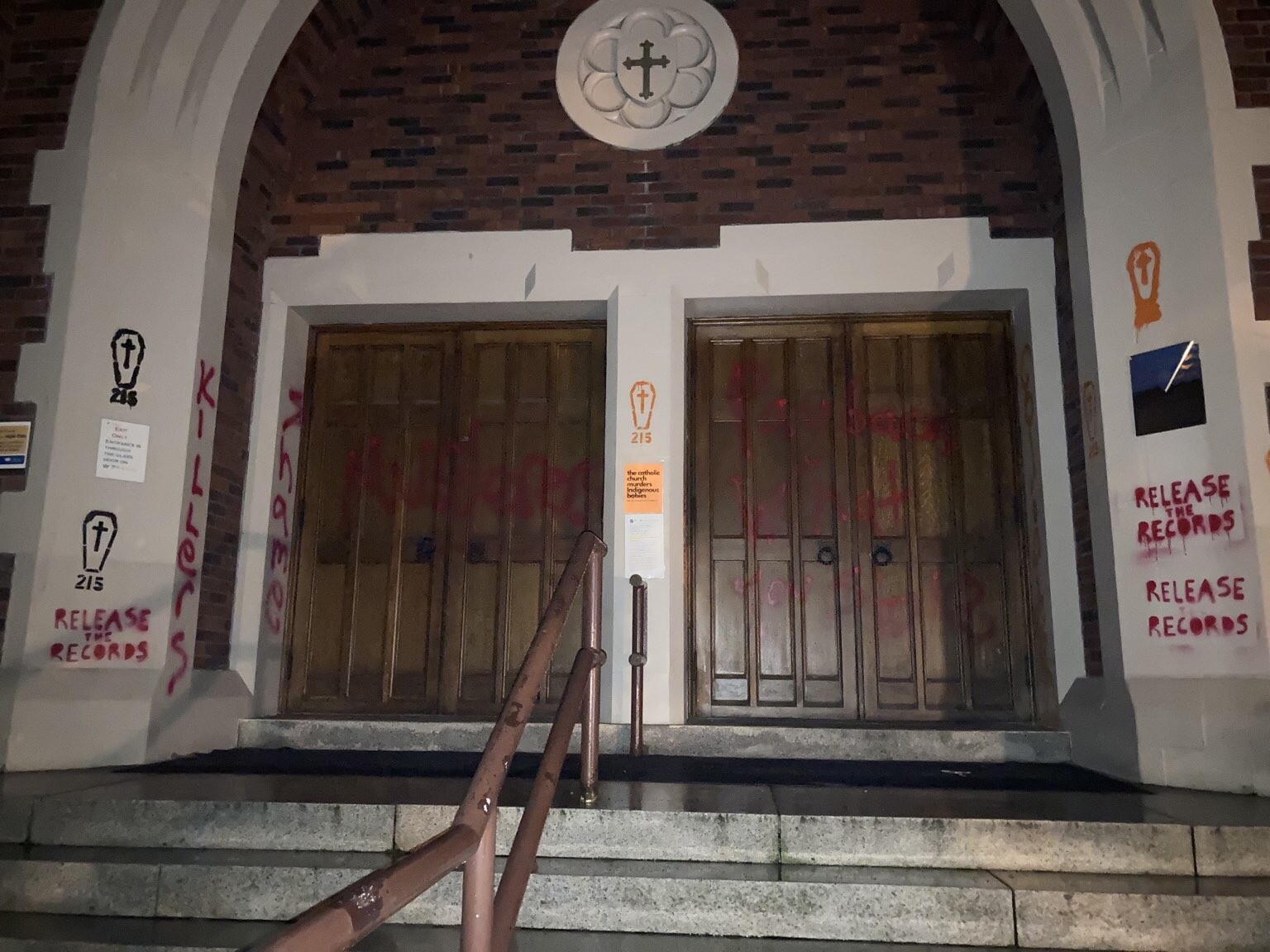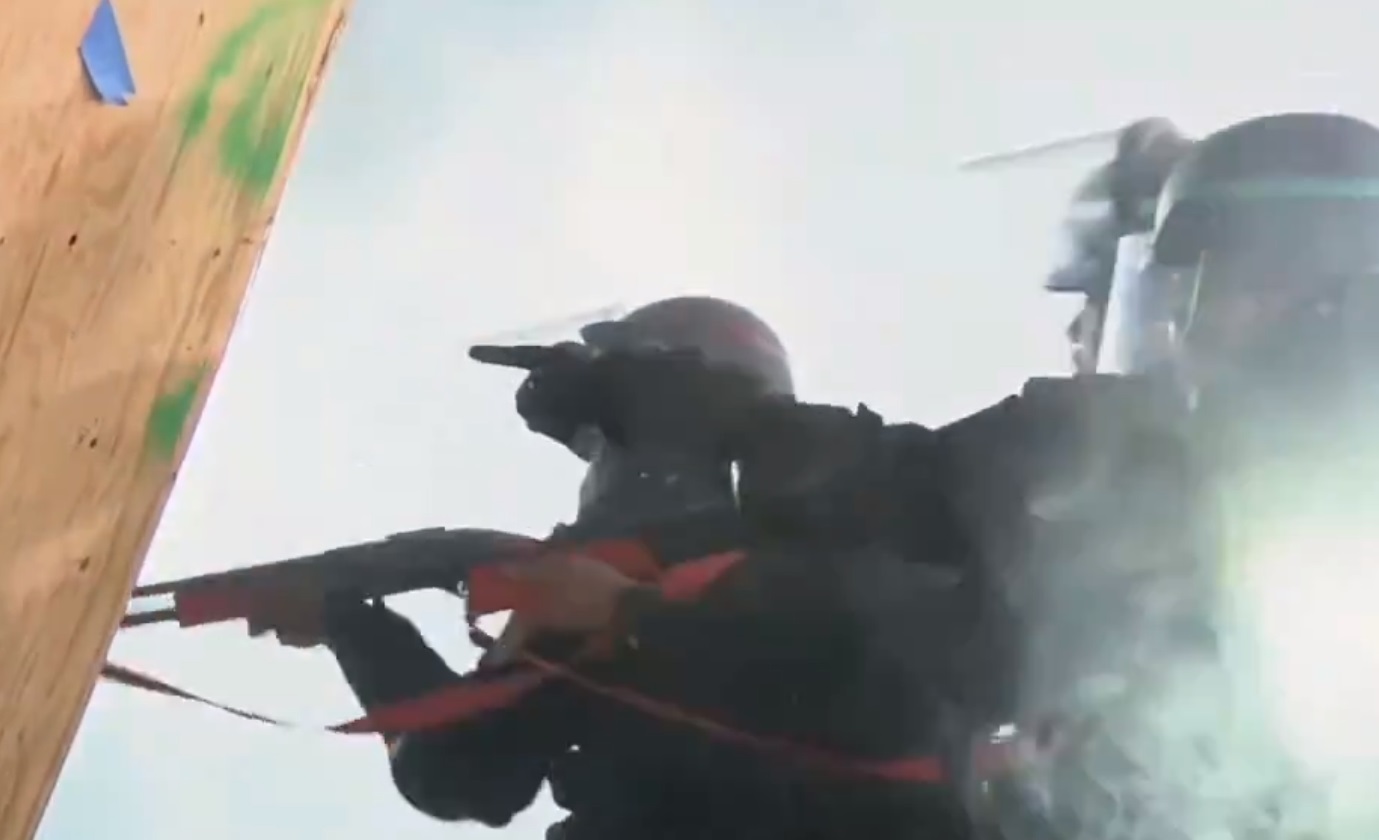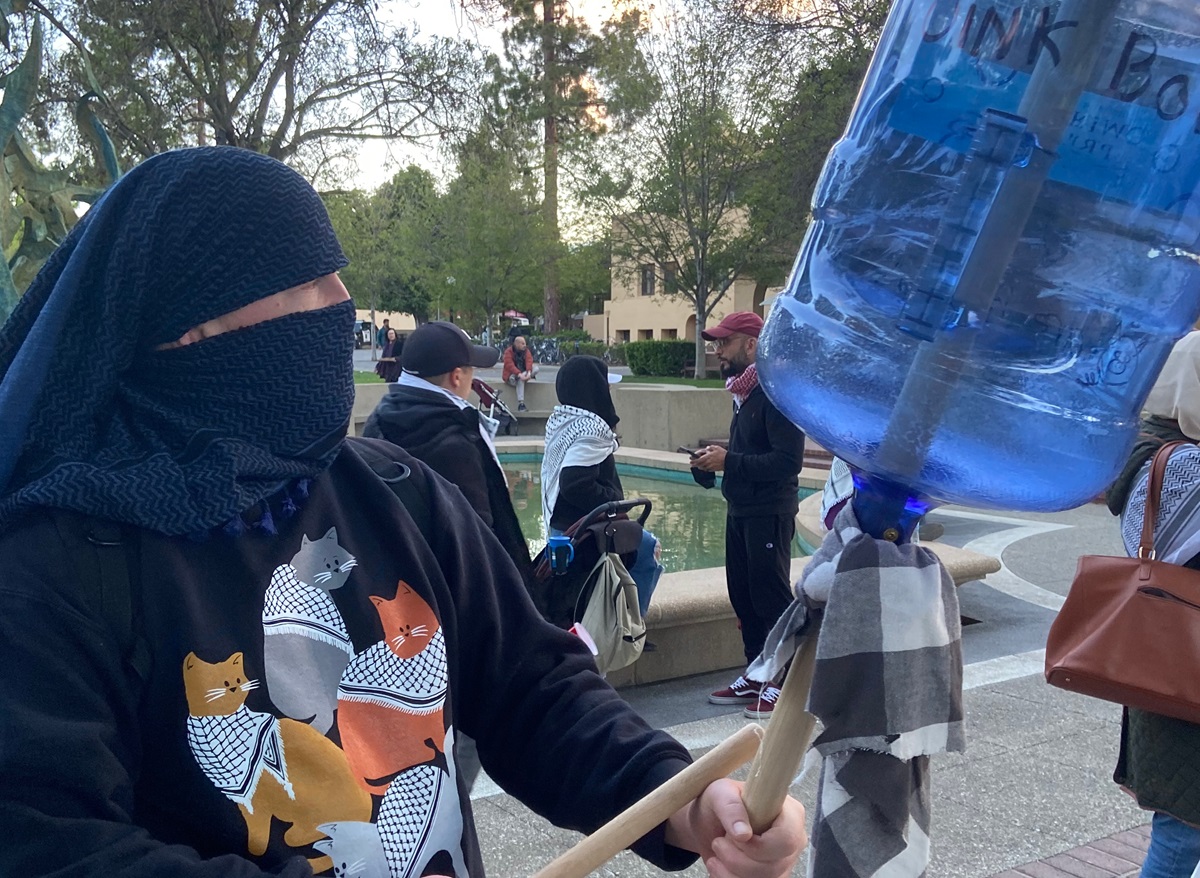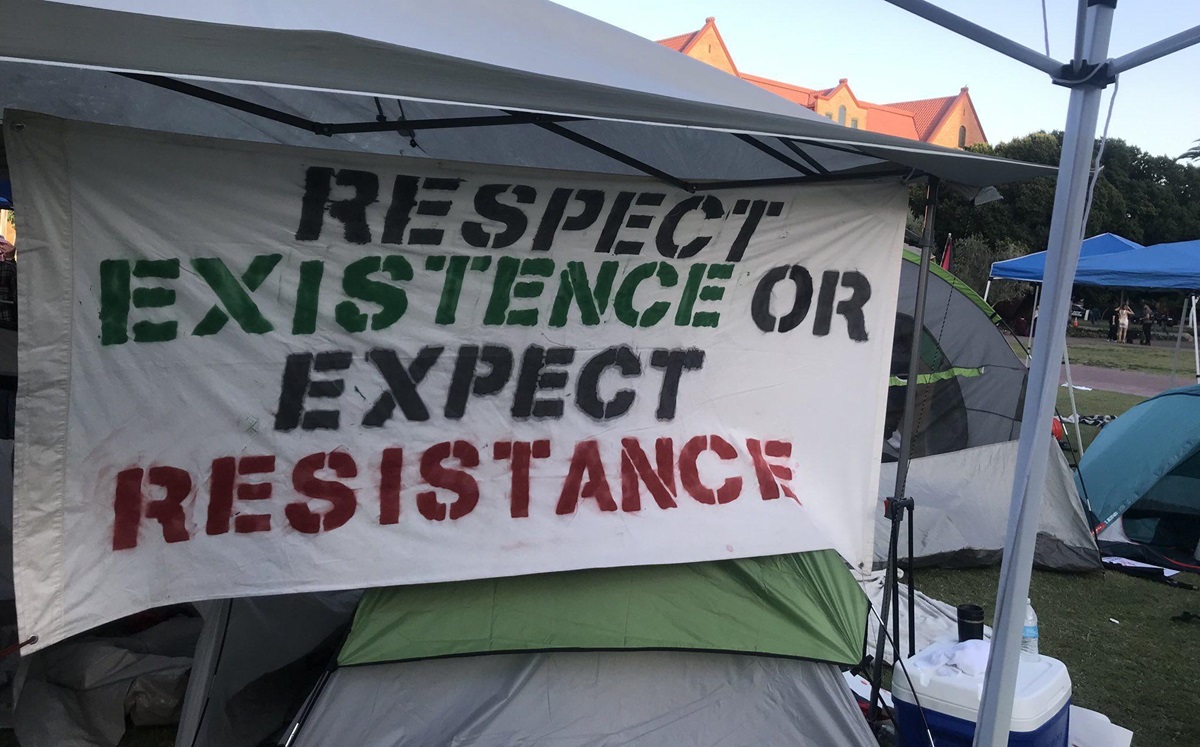Filed under: Canadian Tire Fire, Featured

This week, with further discoveries of residential school mass graves, people across so-called Canada channeled feelings of grief and rage into action. Statues and churches in particular were targets. Actions this week also made connections between Canada’s violent history of colonialism and its ongoing destruction of the land, and targeting of Indigenous peoples. The criminalization and stigmatization of drug use was also top of mind in many cities.
One story this week covers the boycotting of a Toronto Board of Health meeting due to their inaction on the overdose crisis. In a press release, the Toronto Overdose Prevention Society demanded in part, a moratorium on encampment evictions. With the summer weather, this is an ongoing issue heating up again across multiple cities. The inclusion of this demand was a useful reminder of how our many struggles are intertwined, as should be our resistance. With all that in mind, let’s get to this week’s news!
More Residential School Mass Graves Discovered, Canadian Government Continues Fighting Indigenous Kids in Court
While gatherings and outrage continue over the discovery of 215 children in a mass grave at the former Kamloops Indian Residential School, additional unmarked graves have been discovered at similar sites across so-called Canada. As reported by CBC, Muskowekwan First Nation, near so-called Lestock, SK, “said it has found the remains of 35 previously unidentified students” at a Residential School that closed in 1997. Also in so-called Saskatchewan, the Regina Indian Industrial School Commemorative Association has found at least 35 unmarked graves as well. Near Duck Lake, there are reports that there is a burial site at the former St. Michael’s Residential School. Sioux Valley Dakota First Nation in Manitoba are working to identify the remains of at least 104 children buried at the Brandon Residential School. Other Indigenous communities are beginning to search the grounds of nearby former Residential Schools as well.
Meanwhile, as the Canadian government continues to spew meaningless rhetoric of reconciliation and supposed grief, they returned to federal court this past week, “seeking to overturn a decision by the Canadian Human Rights Tribunal ordering Canada to compensate First Nations children for harms they suffered as a result of the government’s “willful and reckless” discrimination.” This court case has been ongoing for 14 years.
Actions Against Colonial Statues and Churches Continue
As news of the discoveries of more mass graves continues to roll in, many communities found ways to express their rage and grief towards the perpetrators of the atrocities of residential schools.
In Kingston, after over a week of maintaining a camp and sacred fire around a John A MacDonald statue in a downtown park, community members were rewarded with the removal of the statue on June 18. In a “compromise” arranged at a City Council meeting, politicians voted to move the statue to the cemetary where MacDonald is buried. Council also voted to remove his name from a local school. Indigenous and other community members, who had vowed to stay at the site until the statue was removed, drummed, sang songs and cheered during the statue’s removal.
Statue glorifying John A Macdonald, seen here eating his own poop, finally removed from public space.
Good riddance.
Every statue of a racist on stolen land is an act of littering and vandalism. Clean that trash up!#JohnAMacdonald#JAM #cdnpolihttps://t.co/qfsopKsNj9
— Agent NDN (@TheAgentNDN) June 18, 2021
In Edmonton, a statue of Winston Churchill was covered in red paint. While no one has publicly claimed the attack, the timing suggests that local activists are doing their part to attack one of their local colonial monuments. Churchill in particular deserves criticism for his documented racist views against Indian and Black people.
In Victoria, Indigenous youth covered a statue of Queen Victoria in red paint in solidarity with old-growth forest defense. This action links the historic violence of colonization with the ongoing degradation of the land, and its impact on Indigenous peoples.
This colonizer is covered in blood red in solidarity with all colonized people. NO PRIDE IN GENOCIDE! We do not derive our authority from genocide. Our power is from the people and the land! pic.twitter.com/WhiIkawPyD
— Siiam Hamilton (@siiamhamilton) June 11, 2021
In Vancouver, a Catholic Church was defaced in direct response to the discovery of the mass grave at the Kamloops Indian Residential School. Graffiti demanding that the church “Release the Records” called out the Oblates of Mary Immaculate, who both operate the church and operated the Kamloops Indian Residential School, as well as almost half of all residential schools across Canada.


In Six Nations territory, it was the Anglican Church who operated the Mohawk Institute Residential School from 1831-1970. On June 12, a suspected arson significantly damaged an Anglican church on the territory. While no one has publicly claimed the action, many community members assumed that the attack was connected the current scrutiny of churches and their role in residential schools.
Week of Action Against TMX
💥 Join us for a 𝑾𝑬𝑬𝑲 𝑶𝑭 𝑨𝑪𝑻𝑰𝑶𝑵 from June 14 – 21 targeting the insurance companies enabling the continued operation and expansion of the Trans Mountain pipeline. 💥 #stopinsuringgenocide #stopunderwritingTMX pic.twitter.com/WFdaGNxKez
— Kanahus Manuel (@KanahusFreedom) June 13, 2021
A week of action called from June 14 – 21 targeting the insurance companies enabling the continued operation and expansion of the Trans Mountain Pipeline saw actions take place in a few locations.
In Los Angeles, activists went to Liberty Mutual’s Plano Corporate Campus with banners to demand they stop insuring the Trans Mountain pipeline. In so-called Vancouver, organizers with Braided Warriors visited Chubb Insurance headquarters with banners and warrior flags to demand they stop insuring the pipeline as well. A demonstration was also held in downtown Montreal, and an action took place on the Assiniboine River in Winnipeg.
Yesterday we gathered on the waters of the Assiniboine River in solidarity with land and water protectors resisting the TMX pipeline. This week is a Global Week of Action demanding that the insurance companies backing the TMX pipeline drop the project! #StopTMX pic.twitter.com/6l3AKMUSl2
— Manitoba Energy Justice Coalition (@mbenergyjustice) June 16, 2021
Overall, participation in the week of action was widespread, with actions taking place across four continents.
HAPPENING NOW: Join @BraidedWarriors @ 250 Howe Street so-called Vancouver to confront @Chubb to demand that Chubb and other insurance companies 🛑 STOP underwriting Trans Mountain pipelines existing and expansion project #stopinsuringGenocide #stopTMX pic.twitter.com/8HjiHJWUcH
— Kanahus Manuel (@KanahusFreedom) June 16, 2021
This week of action comes in the context of years of continued organizing against the expansion of the pipeline. With this resistance has come repression as well. Most recently, earlier this month, Elder Jim Leyden with the Kwekwecnewtxw Watch House was sentenced to 45 days in jail for engaging in ceremony at the gates of the Trans Mountain facility in so-called Burnaby, BC. Jim plans to appeal the decision.
Direct Action Logging Sabotage on Kwakwaka’wakw Territory
As described in an anonymous communique submitted to It’s Going Down, direct action has been taken to disrupt logging in Kwakwaka’wakw Territory (so-called northern Vancouver Island). This action comes in addition to ongoing arrests in the context of old-growth defense in Fairy Creek (Pacheedaht Territory), and resistance against TMX elsewhere in so-called BC. As the communique describes:
two surveyed road routes had their flagging tape and other survey markings removed. if cleared and built, they would allow cutting of old growth and second growth forests.
“this fun, quick, easy action is in solidarity with ongoing kwakwaka’wakw resistance to logging in their territory, in violation of the so called douglas treaties and the sacred land of the kwakwaka’wakw people.
in solidarity with 10+ months of continuous logging blockades in unceded pacheedaht and dididaht territory on the south end of the island, holding strong after 3+ weeks of militarized rcmp invasion! in solidarity with indigenous land defenders who were attacked by white racist western forest products contractors there in early may. klecko for your fierceness and determination!
Toronto Overdose Prevention Activists Stage Alternate Gathering to Board of Health Meeting
Hey @CityofToronto @joe_cressy @JohnTory @gordperks @kristynwongtam are you listening?
Drugs don’t kill people, prohibition does
DECRIM NOW
Save Lives and Decriminalize
Shelters aren’t Safe
OPS save our lives
We grieve thousands pic.twitter.com/CfTetgiETs— Toronto OPS (@TorontoOPS) June 14, 2021
On June 14, while policymakers and politicians at Toronto City Hall met to approve the City Board of Health’s Overdose Action Plan, activists boycotted the meeting and held and alternate gathering outside City Hall. Workers and community members on the frontlines of the overdose crisis chose to boycott the meeting in protest of the endless “tool kits, recommendations, working groups, and proposals” that have done little to address the crisis. Instead, the groups said, they would gather to mourn the friends, family members, colleagues and loved ones lost. In 2020, 521 people in Toronto and 6000 across Canada died of an overdose.
In their submission to the Board of Health, Health Providers Against Poverty stated in part:
We have seen the ways that structural racism, the historical and contemporary impacts of settler colonialism, and classism, ableism, sanism, and other forms of oppression share City policy and directly contribute to the overdose crisis. This emergency has been placed at the bottom of the policy agenda time and time again with devastating consequences for people who use drugs.
They also echoed specific demands made by the Toronto Overdose Prevention Society, including drug decriminalization, harm reduction and overdose prevention sites, overdose response training for frontline staff, and a moratorium on encampment evictions.
Today, our members joined @TorontoOPS in boycotting the @cityoftoronto Board of Health Meeting, and mourning all those who had preventable deaths from overdoses in our city.
Read our submission to the Board below: pic.twitter.com/E8wJzdIWIj
— Health Providers Against Poverty (@HPAP_Ontario) June 14, 2021
Community Pressure Forces an End to Stigmatizing Tour of Vancouver’s Downtown Eastside
"One of the things in the Downtown Eastside is, 'Nothing about us without us.' So the whole concept of poverty tourism, and this type of tour, is really antithetical to that."https://t.co/fQ4Nwc0P96
— Pivot Legal Society (@pivotlegal) June 12, 2021
On the West Coast, community members successfully fought to end a project that exploited and stigmatized residents of Vancouver’s Downtown Eastside neighbourhood. As reported by the Tyee, for $350 per person, the “Scared Straight Tour” offered to tour young people around the neighbourhood, purportedly to educate them about the dangers of drug use. Its website described the neighbourhood as “the worst drug infested ghetto in North America”.
While the tour had been running for many years, a concentrated round of criticism from community members and activists across the country alike on social media last week finally pressured the organizer to cancel the tour. In particular, the tour was criticized for presenting drug use and poverty as a personal choice, rather than the result of social conditions. It also added to the already heavy stigma against drug users that furthers feelings of shame and dehumanization, and prevents drug users from seeking supports.
Cross-Country Reactions to the Death of Cory Cardinal
Cory Cardinal was one of the most brilliant, realest freedom fighters I’ve ever known. He once called me from prison to tell me he read my @EFNewsOnline article against respectability & pinned it up in his cell. To organize & dream with him was an honour.
Rest in power brother. pic.twitter.com/39Dr5hTXJp
— erica violet lee (@ericavioletlee) June 12, 2021
The death of prisoner justice activist Cory Cardinal from an overdose prompted reactions from across so-called Canada this week. A dedicated and outspoken activist, Cory organized a hunger strike at the Saskatoon Provincial Correctional Centre and wrote about ties between racism, colonialism, and incarceration, and their particular impact on Indigenous peoples.

In Montreal, some anarchists painted their neighbourhood in his memory, and wrote in part:
Our thoughts, solidarity, and love are with his family, friends, and comrades.
We’ll continue to direct our rage towards prisons, colonialism, and this world that criminalizes and kills people who use drugs.
Carry Naloxone!
#FreeThemAll
#SafeSupplyLong Live Cory!
A fundraiser is ongoing to cover the costs of his funeral.
Anti-Racism Advisory Council in Alberta Asks for More Cops

A report of recommendations submitted by the Alberta Anti-Racism Advisory Council, a 24 person council created under the provincial NDP, in February of 2021 was just made public this last week. The recommendations include measures that should allow immigrants with professional degrees to resume their fields of work with less re-education and red tape, hiring more mental health professionals, developing an educational curriculum that focuses on anti-Indigenous and systemic racism and a few recommendations that will likely see police forces across the province grow in a time when many groups are calling on police forces to shrink.
The council calls for stable funding for a provincial hate crimes unit, creating “diversity units”, hiring more police of colour, Black, and Indigenous backgrounds as well as mandating anti-racism and implicit bias training. Empirical evidence on whether or not additional trainings and member diversification reduces the number of police killings seems to be inconclusive. Diversification and trainings would also have no impact on laws and policies that criminalize racialized people in different ways. Thus it seems odd that such a council would make recommendations that will only direct more money into policing. That money could be diverted to social assistance, employment programs, mental health response teams, and other social programs that would reduce the number of encounters people would have with police and shift what seem to be more dangerous encounters to people that are better trained to deal with mental health crises.
Our capitalist system is constantly subverting reform attempts and using them to further criminalize and restrict people. Another example can be found in anti-domestic violence groups who have tried to rely on police and laws to reduce violence but learned a hard lesson when laws implemented did not change rates of domestic violence and resulted in arrests and deportations of survivors. These lessons have helped create the current abolitionist movement. We must not forget what movements have learned if we are to reach any sort of liberation.





